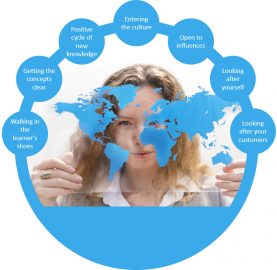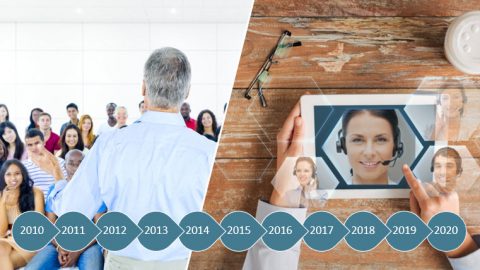My breakthrough moments as a trainer in the e-learning revolution
Oct 31, 2017 · by Béatrice Rivas-Siedel

The turning point
The zero hour came at an e-learning exhibition in Paris. I have always been professionally curious, but until 2015 I was an outsider to the technologies that are transforming our industry. For a few hours on that day a little over two years ago I had stepped into a foreign culture of geeks, LMS providers, gamifiers, community moderators, MOOC developers, e-mentors and techies.
boring, incomprehensible, technical
My honest reaction was that this e-learning world is boring, technical and incomprehensible. It is also the inevitable future of my profession, so walking out of the exhibition centre I decided that I must understand this revolution. I saw that it had something to offer my intercultural work. I knew that I had to master this new way of training and learning.
Self transformation, year three
So began my two-year transformation. And it continues. I am learning every week, enhancing knowledge and practice, but I am no longer in catch-up mode.
The technologies have become more familiar. The new approaches are still energising and sometimes experimental, but they are now inside my expanded comfort zone. The world of e-learning is no long boring, technical or incomprehensible to me.
My journey to becoming a blended-learning trainer
Having made my decision to adopt technology into my training, I first wanted to experience online learning myself, in the role of learner.
Walking in the learner’s shoes.
I chose a programme run by the excellent ISTF, the only organisation I found who really train trainers in the new learning technologies, and offer that training 100% remotely.
Getting the concepts clear
I began to understand the culture and the terminology. Basic concepts like synchronous and asynchronous became clear, and their relevance to training design and training delivery.
Acquiring knowledge in a positive cycle
I learned how to design learning scripts for different formats of training, facilite group sessions and structure blended learning courses
I learned how to use my voice, how to move, how to adjust timing, how to set up exercises and much more.
Entering the culture
Nothing was off-limits. I tried every technology and explored every technique. I got to know the terminology and the buzzwords. I joined the e-learning culture that had seemed so foreign at the expo in Paris. I grew a genuine curiosity in anything e-learning.
Open to influences from unexpected directions

I made sure I had not become trapped in an e-learning bubble. I accepted ideas and influences from other directions too. My approach was always interdisciplinary. I absorbed latest ideas and proven models from
- digital learning
- cross-culture
- working styles research
- principles of training
- design
- nature
I established the intercultural afterwork meetings with a few fellow professionals in Paris. Every month or two I got to exchange ideas, approaches, cultural information with my peers, keeping an open mind to other ways of working.
Looking after yourself
All this self-development sounds like too much, right? Well, you can develop a long way in two years, but the road ahead continues. I am not finished yet. I never let the vast world of learning technologies put me under unhealthy pressure. I did not become overloaded. I integrated all my professional self-development into my working days. Saturday and Sunday remained work-free zones.
Looking after your customers
Working with innovative technologies demands an open attitude to experimentation. But I did not want my customers to pay the price of failures resulting from inexperience. I never used a technique or technology I had not used on myself. I was the first to suffer and remove poor-performing elements from the training programme. I became the tester, and more convinced of the value of the approaches with did work well.
Intercultural training goes digital, a trainer’s perspective
Dec 13, 2017 · by Richard Farkas
Digital learning will not make face-to-face training disappear, says Béatrice Rivas Siedel in this interview with Argonaut. She gives her view as a trainer deep in the digital learning revolution about what we can to do take every advantage. Her insights are relevant for trainers, training providers, client organisations and the learners themselves.
Two breakthrough moments
Two moments stay vividly in my memory, when I recognised that something had changed. I saw that I had progressed to be not only a participant, but a driver of the e-learning revolution.
In France we like to first get the concepts clear, then bring the ideas into practice. In this case, I did the reverse. I built my experience gradually, adjusting my approach, trying new things at a small scale. I was copying, learning, using models, following guidelines.
Now I use a different three words for the e-learning revolution:
Rewarding, flexible, refreshing
A trainer’s transformation
Six decisions in becoming a blended-learning trainer

- Experience it yourself as a learner
- Coach yourself, set yourself goals
- Understand the keywords and the culture
- Be systematic about acquiring new skills
- Consider certification
- Experiment but guard the quality: only use tools which you have used on yourself

